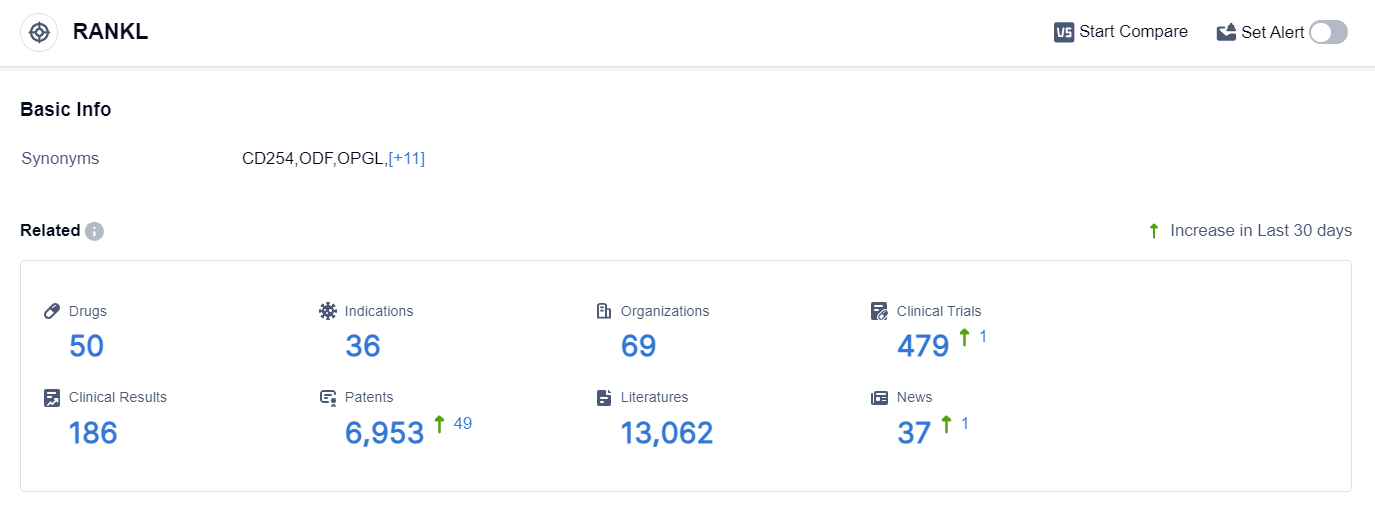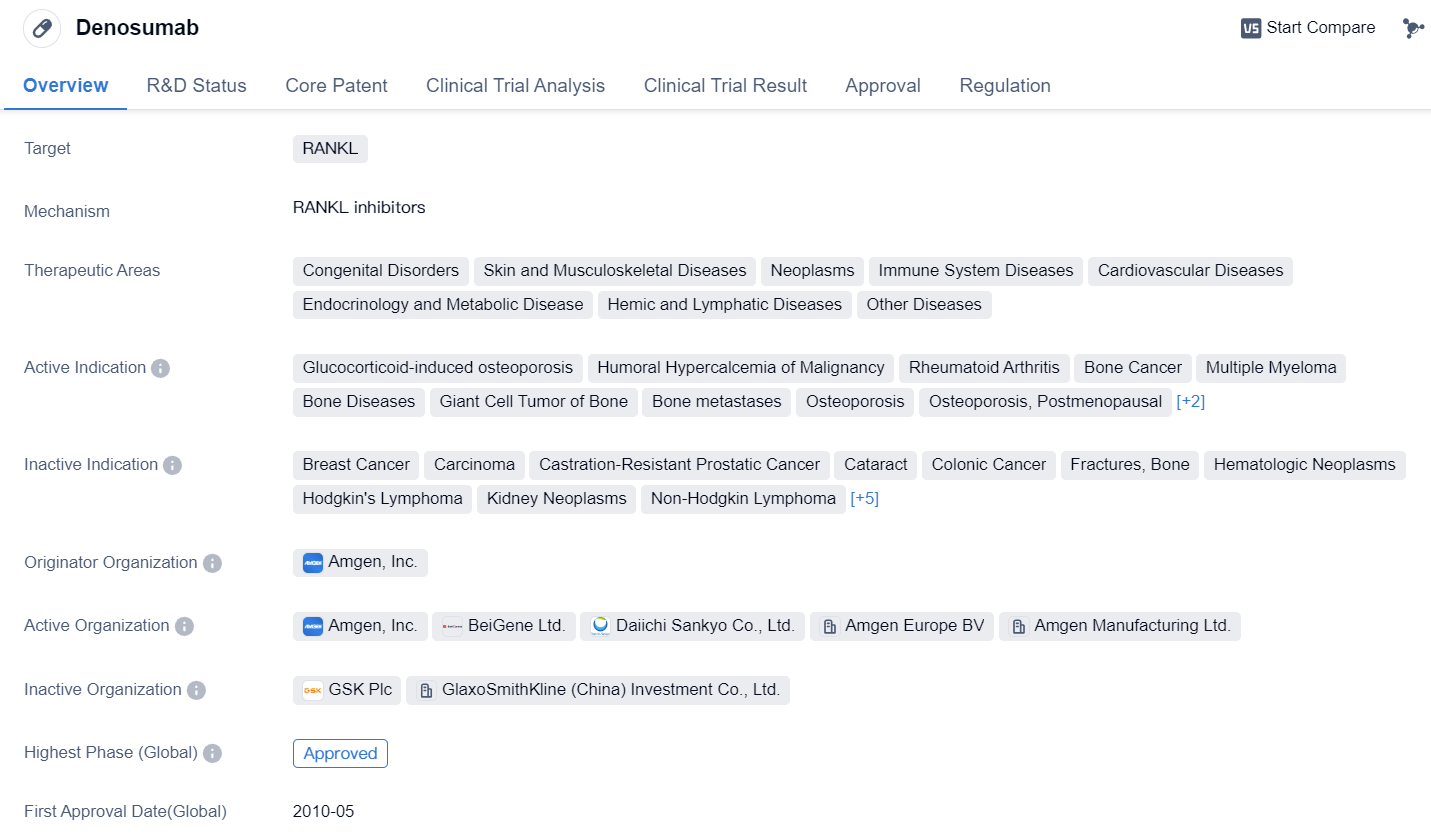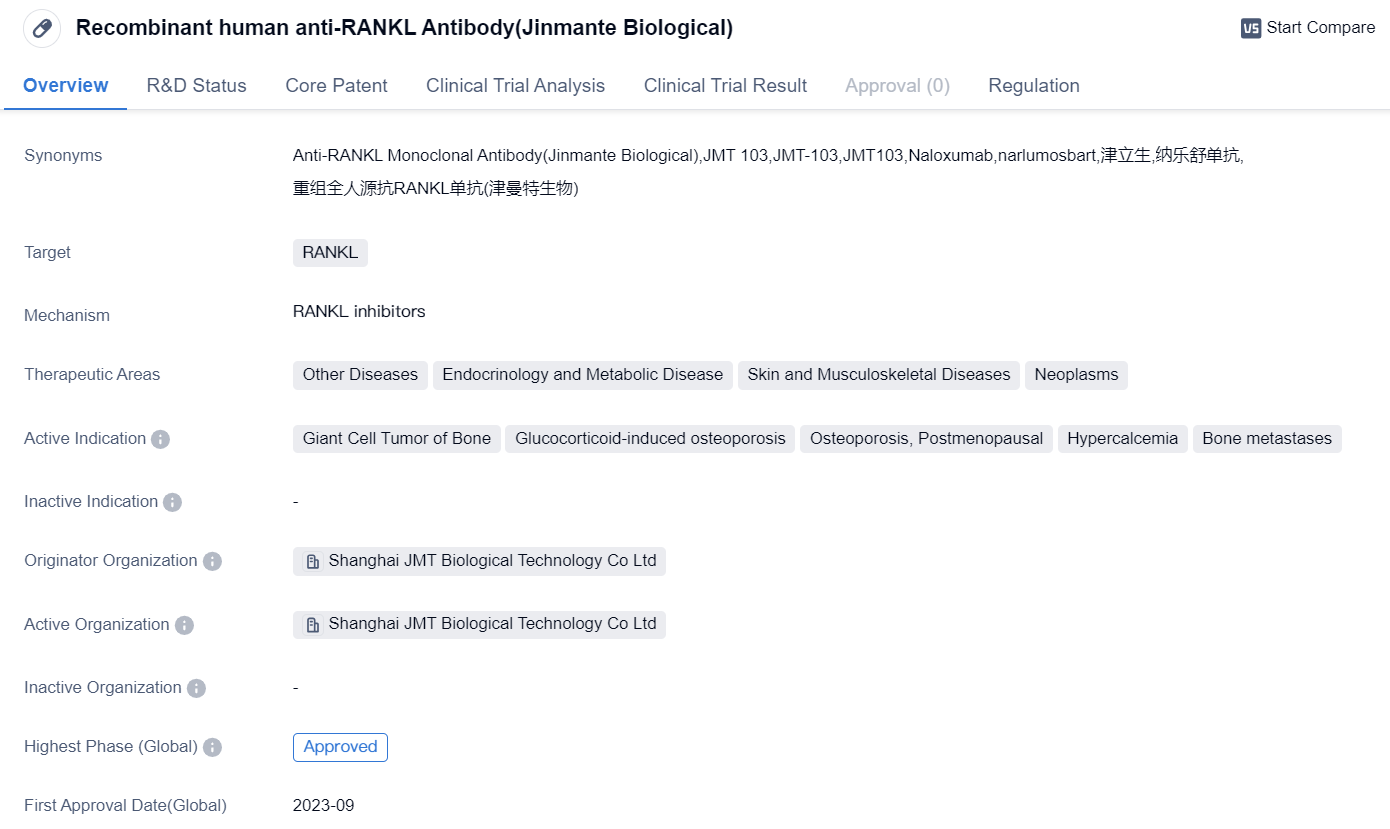Potent "bone-protecting drugs" - RANKL inhibitors
RANKL, or Receptor Activator of Nuclear Factor Kappa-B Ligand, is a crucial protein involved in the regulation of bone metabolism in the human body. It plays a significant role in the differentiation and activation of osteoclasts, which are responsible for bone resorption. RANKL binds to its receptor, RANK, on the surface of osteoclast precursors, leading to their maturation and subsequent bone breakdown. This process is essential for maintaining bone homeostasis, remodeling, and repair. Dysregulation of RANKL signaling can result in bone-related disorders such as osteoporosis, rheumatoid arthritis, and bone metastasis in cancer. Targeting RANKL has become a therapeutic strategy to modulate bone metabolism and treat these conditions.
RANKL Competitive Landscape
According to the data provided by Patsnap Synapse-Global Drug Intelligence Database: the following figure shows that as of 25 Sep 2023, there are a total of 50 RANKL drugs worldwide, from 69 organizations, covering 36 indications, and conducting 479 clinical trials.
👇Please click on the picture link below for free registration or login directly if you have freemium accounts, you can browse the latest research progress on drugs , indications, organizations, clinical trials, clinical results, and drug patents related to this target.
The analysis of the current competitive landscape of target RANKL reveals that companies such as Amgen, Inc., Luye Pharma Group Ltd., and Mabwell (Shanghai) Bioscience Co., Ltd. are growing fastest and have made significant progress in R&D.
Drugs targeting RANKL have been approved for various indications, including osteoporosis, bone cancer, and immune-related diseases. Monoclonal antibodies and biosimilars are the most rapidly progressing drug types, indicating intense competition in the market.
China is at the forefront of R&D activities, followed by other countries/locations such as the United States, European Union, and Japan. The future development of target RANKL holds promise for the treatment of bone-related diseases and cancers, with potential advancements in therapeutic options.
The first approved RANKL inhibitors: Denosumab
Denosumab is a monoclonal antibody drug that targets RANKL, a protein involved in bone metabolism. It has been approved for various therapeutic areas including congenital disorders, skin and musculoskeletal diseases, neoplasms, immune system diseases, cardiovascular diseases, endocrinology and metabolic diseases, hemic and lymphatic diseases, and other diseases.
👇Please click on the image below to directly access the latest data (R&D Status | Core Patent | Clinical Trial | Approval status in Global countries) of this drug.
The drug has multiple active indications, including the treatment of glucocorticoid-induced osteoporosis, humoral hypercalcemia of malignancy, rheumatoid arthritis, bone cancer, multiple myeloma, bone diseases, giant cell tumor of bone, bone metastases, osteoporosis, osteoporosis postmenopausal, osteogenesis imperfecta, and fibrous dysplasia of bone.
Denosumab was developed by Amgen, Inc., a pharmaceutical company. It has received approval in the highest phase globally and in China. The drug was first approved in the European Union in May 2010.
In terms of regulation, Denosumab falls under the category of overseas new drugs urgently needed in clinical settings, priority review, and orphan drug. These designations indicate that the drug is considered important for addressing unmet medical needs, and it has undergone an expedited review process.
Denosumab's approval for multiple indications and its targeting of RANKL make it a versatile drug in the field of biomedicine. Its approval for various therapeutic areas suggests its potential in treating a wide range of diseases and conditions. The drug's originator organization, Amgen, Inc., is a reputable company known for its contributions to the pharmaceutical industry.
Overall, Denosumab is a monoclonal antibody drug that targets RANKL and has been approved for multiple indications. Its approval in various therapeutic areas and its designation as an urgently needed drug highlight its potential in addressing unmet medical needs. Developed by Amgen, Inc., Denosumab has gained global recognition and has been approved in China as well.
Naloxumab
The drug Naloxumab, developed by Shanghai JMT Biological Technology Co Ltd, is a monoclonal antibody that targets RANKL. It has been approved for use in various therapeutic areas, including Other Diseases, Endocrinology and Metabolic Disease, Skin and Musculoskeletal Diseases, and Neoplasms.
👇Please click on the image below to directly access the latest data (R&D Status | Core Patent | Clinical Trial | Approval status in Global countries) of this drug.
The active indications for this drug include Giant Cell Tumor of Bone, Glucocorticoid-induced osteoporosis, Osteoporosis, Postmenopausal, Hypercalcemia, and Bone metastases. These conditions are often associated with bone-related disorders and diseases.
The highest phase of development for this drug is approved, both globally and in China. It received its first approval in China in September 2023. The drug has been granted conditional marketing approval and has undergone priority review, indicating its potential significance in addressing unmet medical needs.
As a monoclonal antibody, Naloxumab is designed to specifically target RANKL, a protein involved in the regulation of bone metabolism. By inhibiting RANKL, this drug may help prevent bone loss and reduce the risk of fractures in patients with conditions such as osteoporosis and bone metastases.
The originator organization, Shanghai JMT Biological Technology Co Ltd, is responsible for the development and production of this drug. Their expertise in biomedicine and pharmaceuticals has led to the successful development and approval of Naloxumab.
In summary, Naloxumab is a monoclonal antibody that targets RANKL and has been approved for use in various therapeutic areas, including bone-related diseases and conditions. Its active indications include Giant Cell Tumor of Bone, Glucocorticoid-induced osteoporosis, Osteoporosis, Postmenopausal, Hypercalcemia, and Bone metastases. Developed by Shanghai JMT Biological Technology Co Ltd, this drug has received conditional marketing approval and priority review, highlighting its potential in addressing unmet medical needs. Its first approval was granted in China in September 2023.






